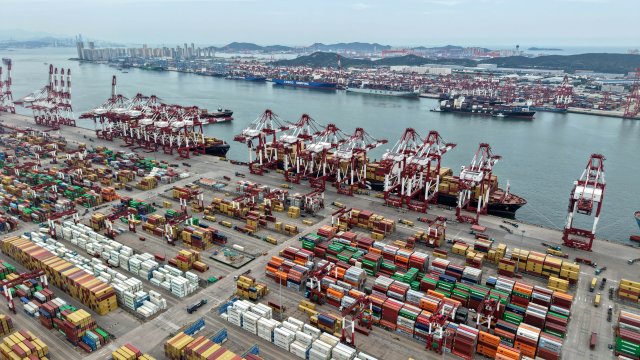China’s export is booming. From the port of Qingdao in the East China province of Shandong, over 40 shipping routes around the world.
Foto: picture alliance/dpa/XinHua | Li Ziheng
In the 1970s, China was one of the poorest countries in the world. How could it be possible to defeat hunger? Even more to become an economic world power? And that under the leadership of a communist party!
Rainer Land’s book pursues these questions in a more fundamental way than you might expect. It is not an eyewitness report, although the author knows the country well, but an analysis that grabs far beyond China, lets the GDR and FRG think of today’s crisis -like situation in the world. What the planned economy fell ill and how the market economy keeps getting crises – you might think you know if you have attended a university in the GDR. No matter in what specializing, political economy of socialism and capitalism were regularly part of the basic course. The financial market capitalism of today was only emerging.
Rainer Land studied philosophy and economics at the Humboldt University in Berlin. Why he needs 98 pages of economic theory before he comes to the Chinese conditions, you can ask yourself before reading this first chapter. Under no circumstances should you overflow it, because aha experiences are guaranteed. Questions also appear.
The conversion of the Chinese economy to a market economy that is also supposed to be socialist was and is affected with many risks. It was a path that needed several stages from 1978 to the present day, including a severe economic and social crisis from 1986 to 1992. Differentiations of opinion challenged a reform process “from above”.
Rainer Land refers to “experimental search and selection processes”, which are “further developed”, and explains the special importance of the Chinese “special economic zones”, which were “the decisive industrial experiment field for the transition to the market economy” and are now increasingly involved in “The new paradigm high technology, innovation, internal market and road (silk road)”. The system of “central planning and management of state companies had to be dismantled or converted into an indirect steering system”. It was new to me that 85 percent of the country’s expenditure was controlled by local governments. But how do you prevent personal enrichment at the expense of the general public?
From the low -wage country as a “workshop in the world”, China wants to go to an innovation -based economic development with centering the internal market. Rainer Land shows what role banks play. He goes into the “silk road fund” and the “China Africa development fund”, deals with land, real estate and the real estate crisis, which forced the government into drastic countermeasures. He looks at communication and transport infrastructure and shows the specifics of the Chinese financial markets, which have to serve primarily to the real economy. The per capita income has grown to 38 times since 1978. The increased youth unemployment also has to do “with the demands of a highly qualified new generation”.
On the way to a “socialism of Chinese character”: what kind of gigantic task the KP China has stood there. Everything can get out of hand if she doesn’t keep the hegemony. Rainer Land does not shy away from the term dictatorship, which of course always has to rely on the consent of the population. “In this context, democracy does not mean that between different parties whose programs and people are chosen, but that a discourse on the goals of economical, social and cultural development is conducted.” Discussions are not only allowed, but is desirable “. But there are “red lines”.
It should not be underestimated that the KPCH and the Chinese state “have a very qualified and well -organized state class and a layer of civil servants. But is a corresponding upbringing enough so that selfish interests do not gain the upper hand compared to the common good? Can a “pedagogical-ideological penetration of society” prevent alienation in the long run? Does it inevitably come to the inside under conditions of a newly sparked Cold War?
If there is talk of socialism, “the free and universal development of individuals” remains a goal, as Rainer Land emphasizes. Although he admits that much is still “future music”: “The specific development goals depend on the level of development and would change over time.”
Rainer Land: China’s directed market economy. Background of a boom. Promedia, 232 pages, Br., € 23.
“Literature salon in FMP 1” with Rainer Land, September 2, 6 p.m., Franz-Mehring-Platz 1, 10243 Berlin.
